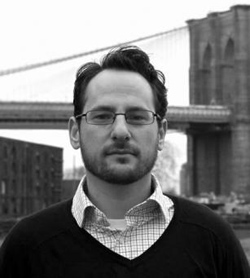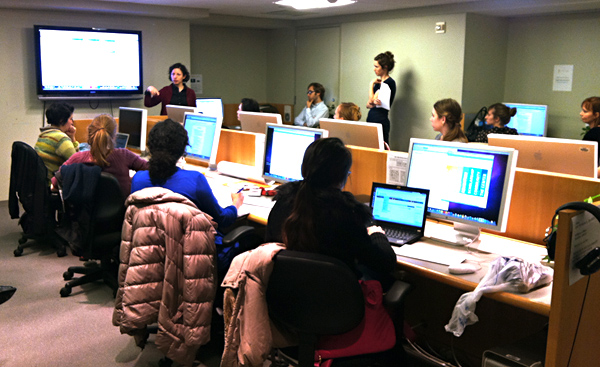Digital Fellows Program, Graduate Center, City University of New York (CUNY)
As part of a strategic vision for public digital scholarship, Digital Fellows at the Graduate Center of the City University of New York (CUNY) work on a variety of digital projects while also learning new skills and approaches that they can apply to their core graduate work. For more information, contact Matthew K. Gold or visit the Digital Fellows website.
Mission
To develop and highlight a broad range of digital projects and resources at the CUNY Graduate Center, and to foster institutional change at the Graduate Center by heightening the public presence of its digital initiatives.
Recognizing the importance of establishing a systematic institutional approach to digital scholarship, the Graduate Center has recently implemented a number of new initiatives designed to benefit students, faculty, and staff while incorporating public-facing digital resources into the institution as a whole. Within this ecosystem of digital initiatives, the Digital Fellows serve as a small, creative team that explores the impact of new technologies on academic research and teaching practices by conceiving of, consulting on, and implementing new digital projects.
People
Directed by Matthew K. Gold under the purview of the Provost’s Office, the first cohort of digital fellows are doctoral students from a variety of backgrounds.
In its initial year, the digital fellows included six graduate students from a range of doctoral programs at the Graduate Center: English, Sociology, Theatre, Art History, Environmental Psychology, and Philosophy. Students entered with varying digital skills and have been expanding their knowledge throughout the year. Fellows generally employ a team-based approach so that members can gain experience in a variety of project roles.

Matthew K. Gold
The program is directed by Matthew K. Gold, who holds joint appointments at the Graduate Center and the New York City College of Technology. Gold is an Associate Professor of English at City Tech, while his roles at the Graduate Center include Director, CUNY Academic Commons; Advisor to the Provost for Master’s Programs and Digital Initiatives; and Acting Executive Officer, MA Program in Liberal Studies. Gold recently edited a collection of essays related to the digital humanities, titled Debates in Digital Humanities. Other projects include “Looking for Whitman”, a multi-campus experiment in digital pedagogy sponsored by two NEH Digital Humanities Start-Up Grants, Commons In A Box, funded by the Alfred P. Sloan Foundation, and JustPublics@365, funded by the Ford Foundation.
Funding for the Digital Fellows Program is generously provided by Graduate Center Provost Chase F. Robinson.
Structure
The program provides a one-year renewable fellowship with an expectation of 15 hours of work per week; fellows meet weekly to gain skills and discuss projects.
Started in 2012 with a cohort of six graduate students, the Digital Fellows program uses an employment model that assigns students to various projects of interest to the university. Fellows receive generous funding in exchange for 15 hours of work per week. The work is designed to challenge the fellows into learning and applying new skills within a collaborative learning environment. The renewable year-long fellowship targets early- to mid-career graduate students, with the hope of retaining some portion of the cohort through subsequent years to build a deeper knowledge base.
While each fellow’s project is unique, the group meets weekly with director Matt Gold to brainstorm, discuss progress and challenges, and to learn the skills needed for their respective projects. Workshops are sometimes conducted by invited guests, exposing fellows to a broad range of expertise.
Institutionally, the program is situated within the Office of the Provost; there are no fixed relationships with departments, but rather those relationships fluctuate depending on the backgrounds of the Fellows. The program is part of a larger set of digital initiatives at the Graduate Center.
Research
While the program is still in the early stages of development, the first cohort of fellows are leading a variety of innovative projects to advance the digital initiatives of the Graduate Center.
The projects that the Digital Fellows are undertaking are all public-facing and will have demonstrable benefits for various components of the CUNY system. Fellows are working on public-facing peer-to-peer review projects; an ongoing blog, Tagging the Tower, that explores digital topics and also features reflections on the Digital Fellows Program itself; a popular series of workshops for students, faculty, and staff at the Graduate Center; overhauling the Provost’s website; creating an academic portfolio site for Provost Chase F. Robinson; helping to create an interactive open-access version of Debates in the Digital Humanities that allows user annotation and sharing; planning a Spring 2014 conference on graduate education; working on a digital seminar for first-year students at the Graduate Center; designing a website for the newly-created CUNY Institute for Language Education in Transcultural Context (ILETC); and engaging in one-on-one consultations and collaborations with faculty members to find digital solutions to their research and pedagogical endeavors as well as to expand the reach of their work to the wider public.

GC Digital Fellows conduct a workshop for students, faculty, and staff at the Graduate Center
Project profiles are available on the Digital Fellows website—itself a product of their work.
Support
Financial support for the program is completely internal to the Provost’s Office, which signals a strong institutional commitment.
The Digital Fellows program is unusual in comparison to other programs featured in the Praxis Network in that it benefits from full internal funding as a component of the Provost’s strategic plan for digital initiatives. Fellows work at the GC Digital Scholarship Lab, which is in a start-up phase.
Directions
This new program is experimental, so many successes and challenges are anticipated. One hope is to retain some students in subsequent years to build up a base of knowledge and expertise.
Gold hopes that as subsequent cohorts enter the program, a rich knowledge base will be retained, enabling future groups to progress more quickly and create more robust projects. The primary student-centric goal is that each fellow will have gained a substantial set of new skills and approaches upon completion of the fellowship year, and that the work they have done will have a marked influence on their understanding of their own doctoral work. Institutionally, the aim is to feed a larger transformation within the Graduate Center as digital work comes to increasing prominence. The collaborative nature of the program—fellows collaborating with each other and with faculty across the GC system—is designed not only to foster a healthy and productive learning and working environment for the fellows, but also to integrate their work into larger digital projects at CUNY, such as the CUNY Academic Commons.
Nuts & Bolts
The experimental nature of the program means that it is highly flexible, but also means that frequent evaluation and possible course-correction may be needed.
The Digital Fellows program is very much an experiment, which means that the program and the facilities it uses have been evolving while the program is underway. Consequently, the program has a good deal of flexibility, but the tradeoff is that there may be some false starts while the program is being refined. If you’re considering implementing a similar program, consider how it will fit within your university environment:
- Which disciplines might have interested students?
- Are there existing fellowships that might target the same group, and if so, how will you clearly differentiate the goals so that the program attracts students most likely to do well in the environment of the program?
- Another important consideration is staff time: while it’s desirable to dedicate much of the program’s funding to students, it is also crucial to ensure that there is adequate support for the students and program leaders.